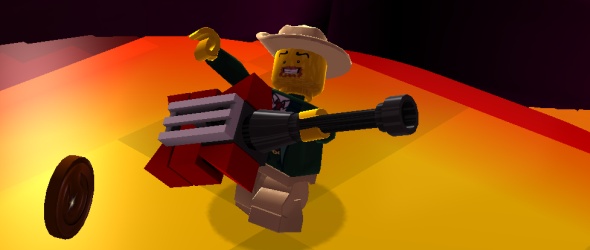Our Verdict
Fun in the purest sense of the word, Lego Universe is a delightful MMO that involves your imagination but ends much too soon.
PC Gamer's got your back
I don't know who Redboy31 is, but I want to be his friend. His player-built property, The League of Engineers, is everything I wanted my treehouse fort to be when I was a kid. It's got a high wall guarded by big guns, friendly robots, a secret meeting room at the top of a huge elevator, and a prank lever that playfully zaps anyone who touches it!
It wasn't until I began exploring the player-owned properties – the plots of land where players can build freely – that I understood what Lego Universe really is: an online realm of imagination where kids (and kids at heart) build secret forts and craft huge castles guarded by pirate boats in the sky; where ninja hideouts are protected by giant samurai robots and pirates who find cursed treasure are transformed into skeletons.
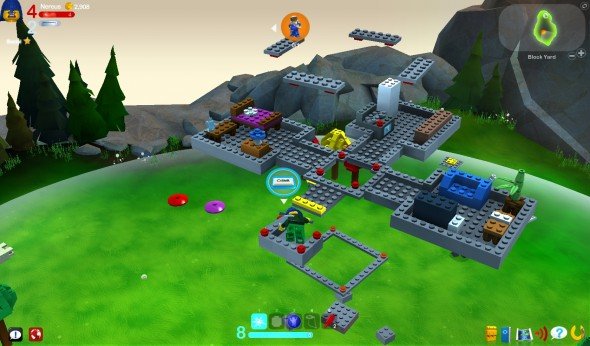
This is the Rolls Royce of kiddie MMOs – the game the cool kids will be talking about on the playground. It's an accessible MMO, introduced by an enthusiastic Patrick Stewart and boasting an unheard of level of polish for a just-launched game. Elaborate spawning animations let zombies burst from the ground instead of appearing out of nowhere, and small, charming touches like being knocked into the air from a blast of water when you smash a fire hydrant or the security-minded Lego figure that playfully covers his eyes when you type in your password make LU feel really top quality.
The player progression set-up is unique, ditching arbitrary levels and XP in favour of letting players become more powerful naturally as they explore and collect hidden tokens (or earn them through achievements) that permanently boosts their character's health pool, armour limit and imagination (aka mana). There is no class system, so collected body parts – legs, chest, headpiece, cloak, and held objects – can be swapped at any time to define what role you want your character to be specialized for. A few hours in, players will be asked to join one of four factions: The Assembly (building), The Venture League (exploring), The Sentinels (fighting) or The Paradox (mystical fighter). Your choice nets you your first set of powerful, ability-granting gear: for example, Venture League recruits get a legs piece that enables you to jump long distances.
Limited inventory
It's an elegant and fun system, appropriate for the Lego universe, but hampered by a needlessly restrictive inventory system. I was continually forced to throw away unique parts and items that I wanted to keep in order to make room for quest items. A banking system or loot stash is desperately needed.
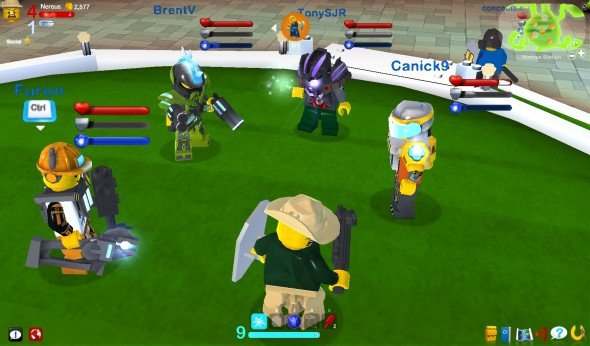
By comparison to how inventive and diverse LU's characters are, the things that they ask you to do are disappointingly derivative. Every task I faced was solved by running to a specific location, smashing enemies and quick-building piles of hopping bricks into usable objects-turrets, launch pads and the like – by pushing Shift. Smashing enemies isn't difficult, and thanks to the lazy autotargeting system, combat requires little more than repeated clicking. You do have a few activated abilities, such as a spinning roundhouse kick or pistol shot, but you'll get through most fights without them. The only penalty for dying is dropping a few coins that can be reacquired by returning to the site of your death.
LU's quests are little more than tour guides; small sticks that nudge you around the next corner so you discover what exciting people or places lie there. Wisely, LU doesn't rely on its simplistic combat and missions to entertain – the big breaks from monotony are found in the many minigames, such as arcade style racing games, a co-op combat survival game that hosts up to four players' last stand, a pirate ship shooting gallery and well-placed footraces located around the world that add a competitive carrot to running between quest locations.
The minigames' voodoo magic is the way they invariably pop up just before you realize that you're ready for a diversion from the main game. I can't overstate how superbly designed the flow of Lego Universe is; I was constantly lathered with new and exciting locales to visit, games to play, things to smash, and objectives to build. Your button-pushing is rewarded with a near-endless shower of imaginative and rewarding visual treats in exotic locations. When I stumbled across a bumping rock concert stage, I didn't care that I'd just about worn out my Shift key with quick-builds. I was more than happy to climb that stage and press Shift yet again to watch my character quick-build an electric guitar and become a Lego rock god.
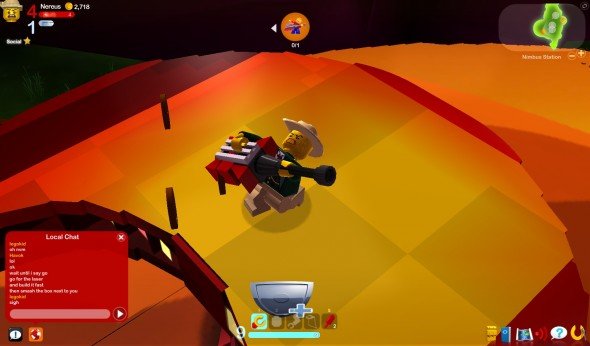
Some friendly
The minigames are fun, especially if you have a lot of friends, since it automatically ranks your high scores against theirs. (I befriended everyone I encountered, just so I had more people to compete against.) Though for such a compelling part of the game, you'd think they'd be easier to access – some minigames are located far off the beaten track and require you to idle there while you wait for others to join before it can launch, which can take up to 15 minutes. A portal area where you could access them all at will would've been a much better idea.
It's nearly miraculous for an MMO to succeed at entertaining a player for the first dozen hours as well as Lego Universe does. But around the 15-hour mark, it suddenly becomes painfully clear how NetDevil managed to pull that off: the content is incredibly front-loaded. Around that time, you realize that you've almost gone through every area in the game. Quests begin to require significantly more grinding to complete (collect 30 of X, kill 30 of Y) – it almost feels as if the developers noticed that the directed content of their game ended way too quickly at the exact same moment that you did. For £30 up front and £7.50 a month afterwards, I expected more than 15 hours of content, even at the game's launch.
To be fair, there's no shortage of things to do even when you start to wrap up the major quest lines. LU is flush with systems designed to enrapture imaginations and lure collectors for weeks, even months beyond. Every time you enter or depart from a zone, a summary pops up detailing what you have and haven't completed, collected and earned from that area. I felt that instinctive tug in my gut every time I saw that I hadn't found all the secret flags, collected all the pets, or had missed a quest in the zone.
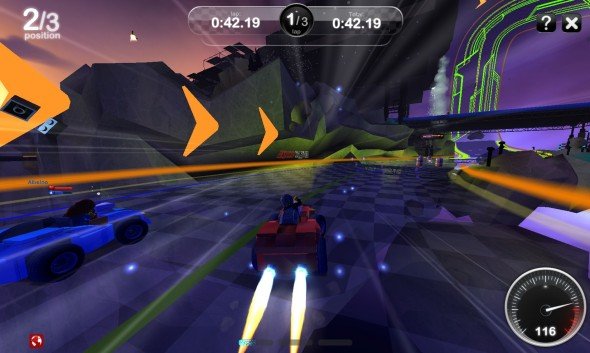
Players will spend a lot of their post-quest time building Lego mansions on their own private plots of land (unlocked as you explore the world). I built what I could with the respectable set of bricks and models I'd garnered from questing and minigames, but soon found that my imagination (facilitated by the slick visual programming tools that let you easily spawn enemies and design complex player interactions with anything you build) outgrew my brick bank. So I hunted down brick and model vendors around the world to browse their wares, playing minigames and smashing baddies for the cash I needed to purchase them.
This is the creative endgame that NetDevil hope will keep players paying that £7.50 after the quest content has dried up. It might work for especially imaginative, build focused players, but most gamers will likely exhaust their creativity or get worn out by having to replay the same minigames over and over to earn more building materials.
Pants
LU's unique game design works for me because I buy into the game's philosophy: that the fun of its rewards can be just as satisfying as getting a stat-boosting pair of pants. Its insanely colourful and interactive world lets my imagination run wild in a very entertaining way – but if you tend to only measure success in an MMO by your stats, LU isn't likely to appeal to you as much.
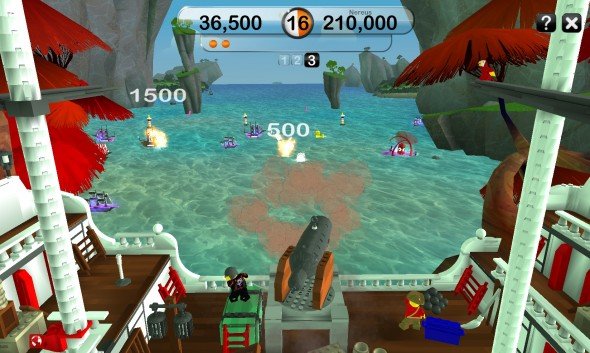
It's a shame that NetDevil didn't pursue a free-to-play business model, selling small Lego kits as microtransactions (like they do with the real bricks). Lego Universe is an incredibly fun diversion, ripe with whimsy and creativity, but the subscription fee will drive away everyone but obsessive builders after they consume the skimpy content.
Fun in the purest sense of the word, Lego Universe is a delightful MMO that involves your imagination but ends much too soon.
